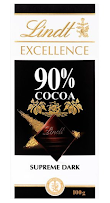As someone who needs to keep sugar and carbohydrates under strict control, I abandoned chocolate quite a while ago.
Mainstream dark chocolate is even higher in sugar because more sugar is needed to offset the bitterness which most people don’t really like. So Cadbury’s Bourneville is 60% carbs, again mostly sugar.
So I’ve been sampling some of these low carb, low sugar chocolates recently. Of course, these very high cocoa chocolates are very different from the more usual, sweet chocolate bars. Instead, they are quite bitter - an acquired taste for most people. And, like fine coffee or fine wine, each brand has its own distinctive style, taste and mouth-feel.
All of these fine ingredients, without the usual cheap ‘fillers’ (cream, sugar, vegetable oil) don’t come cheap and the starting price is about £2 for a 100g bar.
Typical chocolate, such as Galaxy or Cadbury’s Dairy Milk contains over 50% carbohydrate and most of this is in the form of sugar.
Mainstream dark chocolate is even higher in sugar because more sugar is needed to offset the bitterness which most people don’t really like. So Cadbury’s Bourneville is 60% carbs, again mostly sugar.
But I recently noticed that chocolate with very high amounts of cocoa has hardly any carbohydrate or sugar. Once you get above 70% cocoa the amount of carbohydrate quickly rolls off. So a 70% cocoa bar is about 35% carbohydrate, an 85% bar is only 18% carbohydrate, a 90% bar is about 14% carbohydrate and a bar of 100% cocoa is only 8% carbohydrate, with less than half of that being sugar.
So I’ve been sampling some of these low carb, low sugar chocolates recently. Of course, these very high cocoa chocolates are very different from the more usual, sweet chocolate bars. Instead, they are quite bitter - an acquired taste for most people. And, like fine coffee or fine wine, each brand has its own distinctive style, taste and mouth-feel.
As well as the natural variation in the cocoa beans which are used, there are also differences due to the other ingredients. Godiva’s 90% bar includes more cocoa butter, giving it a nice smoothness. Lindt’s bars are a little less smooth, whilst Montezuma’s bars are positively gritty. Their 100% cocoa bars don’t really have space for any other ingredients to smooth things.
All of these fine ingredients, without the usual cheap ‘fillers’ (cream, sugar, vegetable oil) don’t come cheap and the starting price is about £2 for a 100g bar.
I’m not claiming that these high cocoa chocolates are health foods (although some people do): they still have plenty of calories and are quite high in fat too. But I enjoy having a couple of squares of chocolate now and again without blowing my carbohydrate target.


